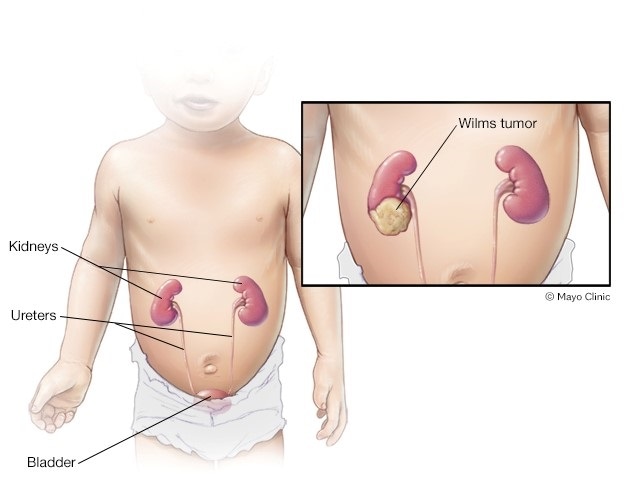Jan. 11, 2024
While kidney cancer is rare in children, Wilms tumor is the most common type of kidney cancer in kids, with between 500 and 600 children diagnosed annually in the United States. Thanks to advances in treatments over the past several decades, survival rates from this rare cancer have improved significantly.
"Every Wilms tumor presents differently — in size, location, complexity, and whether it has spread to other organs," says Stephanie F. Polites, M.D., M.P.H., a pediatric surgeon at Mayo Clinic in Rochester, Minnesota. "As a result, the multidisciplinary team at Mayo Clinic Children's Center is quickly assembled to develop an individualized care plan for each child."
 Wilms tumor on kidney
Wilms tumor on kidney
Torso of a child in a diaper with labels indicating the locations of the kidneys, ureters and bladder. Inset shows a Wilms tumor on a kidney.
"From the moment a child is diagnosed with a kidney tumor, our team meets to discuss the plan of attack," says Candace F. Granberg, M.D., a pediatric urologist at Mayo Clinic in Rochester, Minnesota. The pediatric solid tumor team — consisting of pediatric oncologists, radiation oncologists, pediatric radiologists, pediatric surgeons and pediatric urologists — meets to review each case and determines the first step for treatment of the tumor. "We coordinate care to streamline consultations and procedures at Mayo Clinic to minimize the frequency of trips families must take, ensuring a more efficient and convenient experience," says Dr. Granberg.
Prior to initiating treatment, the oncology team determines if the treatment for the cancer may affect future fertility and, if so, will offer the family options for fertility preservation. The Pediatric Fertility Preservation Program at Mayo Clinic Children's Center is one of a few in the country with an approved research protocol for prepubertal children who will receive chemotherapy and in some cases radiation that may impair future fertility. The team of pediatric urologists, pediatric surgeons, medical oncologists, pediatric gynecologists, embryologist and lab specialists mobilizes quickly to meet with families and arrange for the procedure. Whenever possible, this procedure is integrated with other necessary procedures or imaging scans, an approach aimed at minimizing anesthesia exposure for our young patients.
To help with surgical planning, pediatric radiologists at Mayo Clinic construct life-size, anatomic 3D models of the Wilms tumor and surrounding structures. This approach has proved extremely useful in challenging circumstances, such as when removing only the part of the kidney containing the tumor (partial nephrectomy) or removing multiple tumors from one kidney.
Treatment of the tumor often necessitates removal of the entire kidney and nearby lymph nodes through an incision on the abdomen. Given the substantial size of many Wilms tumors and their proximity to vital structures and organs, our pediatric surgical team who specializes in complex abdominal operations for children plays a pivotal role in ensuring optimal outcomes.
Sometimes a tumor will extend into major blood vessels, and the surgical approach requires the assistance of vascular surgeons. "We are very blessed at Mayo Clinic Children's Center to have these specialists right down the hall from our pediatric operating rooms. They bring their entire team to our room and either reconstruct the major vessels or place grafts if needed," says Dr. Granberg. "These are procedures they do all the time, so having them there for these rare cases in kids is truly unique and necessary for a successful surgery."
Proton beam therapy is another important advancement in the care of children with Wilms and other childhood cancers. Mayo Clinic is one of the few centers in the United States that offers proton beam therapy — highly targeted precision beam therapy that destroys cancer while sparing healthy tissue. Proton beam is an important component of the treatment plan for children, as it prevents damage to developing organs and reduces long-term complications, side effects and secondary malignancies.
Research on Wilms tumor is ongoing, and our team of experts at Mayo Clinic is studying novel ways to treat this rare cancer in our own laboratories and through collaboration nationally. "Though a cure is possible in the majority of cases, we need to do better — we want to cure everyone," says Patricio C. Gargollo, M.D., a pediatric urologist at Mayo Clinic in Rochester, Minnesota. Mayo Clinic is part of the Children's Oncology Group, providing our patients with access to the latest clinical trials and pioneering advancements in research.
Wilms tumors are rare, but with the right care team, meticulous surgeons and cutting-edge research, children truly get top-of-the-line treatment at Mayo Clinic.
For more information
Fertility Preservation Program. Mayo Clinic.
Proton Beam Therapy Program. Mayo Clinic.
Pediatric Urology. Urology — Research. Mayo Clinic.
Pediatric Surgery. Mayo Clinic.
Refer a patient to Mayo Clinic.